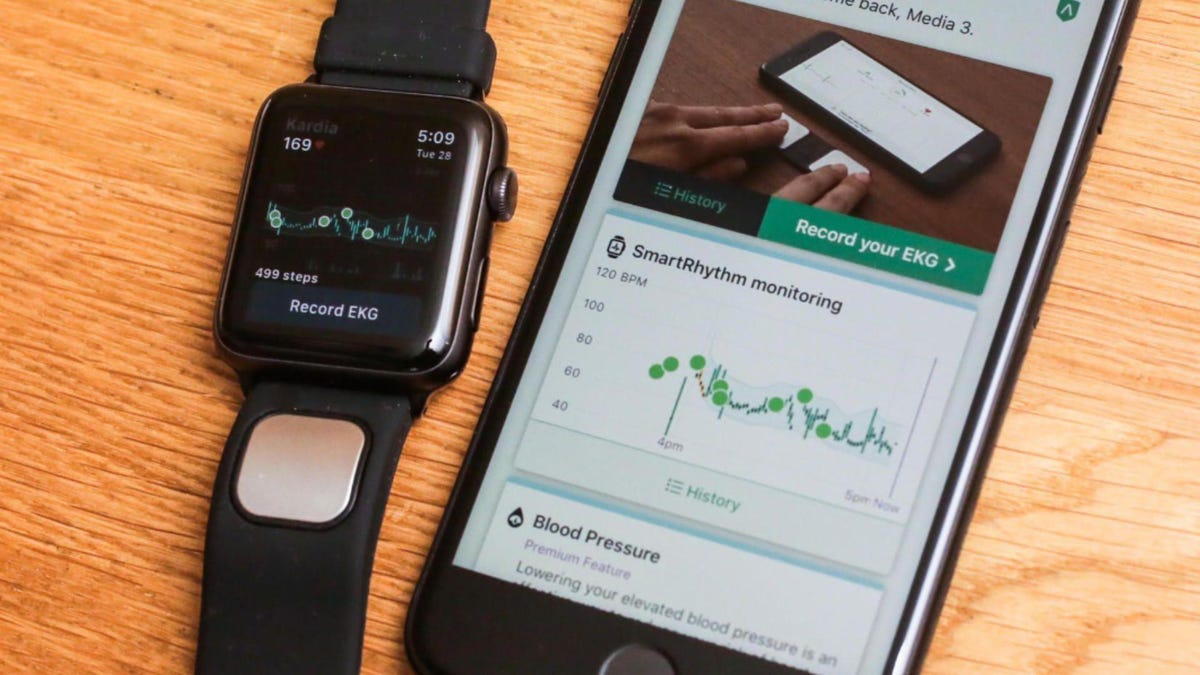 Why You Can Trust CNET
Why You Can Trust CNET The doctor's office becomes wearable
Checking your vitals one day a year is like wearing a blindfold the other 364.

If you treated your car like you treat your body, you'd be calling AAA a lot. The annual checkup is akin to a car whose gauges only operate for an hour a year. But we're getting the tech we need to radically remake that 19th century concept.
Here are four examples new to the market, or on the way soon.
Disclaimer: CNET may get a share of revenue from the sale of the products featured on this page.
Omron HeartGuide
The Omron HeartGuide is a blood pressure machine in wristwatch form. It works just like a full-size machine -- a sphygmomanometer -- and will be going for FDA clearance. It won't require a prescription and comes at a time when more of us need it: New blood pressure guidelines issued in early 2018 suggest 46 percent of Americans have high blood pressure, up from 32 percent under the decades-old standard. The maladies hypertension can cause are almost too numerous to count.
If your last annual checkup showed that you have normal blood pressure, don't sleep too well: Major studies have found that 18-33 percent of us have white coat hypertension, where high blood pressure only presents itself at the doctor's office. And perhaps another 10 percent of us have masked hypertension, which doesn't show up at all during a physical. Constant monitoring can surface these, so you're neither taking pills you don't need, nor not taking pills you should.
The Dexcom G6 is a wireless continuous glucose monitor that can send readings every 5 minutes to an app. Its readings are a few minutes behind, but its depth of data is like no finger stick.
Dexcom G6
The Dexcom G6 is a small glucose monitor that wirelessly reports your blood sugar reading as often as every 5 minutes without finger sticks or calibration in most cases. Just carry a small Bluetooth reader or use the G6 app on your phone. The readings are 10-20 minutes delayed since the device doesn't directly read blood, but its ability to record and reveal insights is, technically, the painless equivalent of 288 finger sticks per day.
The Medtronic Guardian Connect and Abbott Freestyle Libre round out this competitive category and all are aimed at eventually getting many of us to to wear them to avoid ever becoming Type II diabetic. That will require progress on retail pricing or Medicare coverage, which the Dexcom G6 does not yet enjoy.
Alivecor KardiaBand
The $199 Alivecor KardiaBand is the first FDA-cleared watch band that functions as a simple electrocardiogram (ECG) machine, something you used to have to visit a clinic to benefit from. The band is 84 percent accurate at discriminating normal heartbeat from atrial fibrillation, a key contributor to future risk of stroke.
The Alivecor Kardia (left) started as a phone accessory before it appeared in Apple Watch band form. Both integrate with Omron's consumer blood pressure machines (right) for greater insights.
Alivecor and Omron work together so their products can blend their respective health signals into a more meaningful snapshot, so you and your doctor get more insights, not just more data. For the majority of people who don't have an Apple Watch, Alivecor offers the same functionality in a form that works with any smartphone and only costs $99.
Beyond Verbal
A groundbreaking study conducted at Mayo Clinic recently found the first evidence that voice may be an accurate indicator of whether a person has coronary artery disease. Eighty-one tonal features of voice were measured after patients spoke to a recording app using technology from vocal biomarker company Beyond Verbal. Pending further confirmation, this could open the door to you monitoring your circulatory health by just talking.
So the gear is here, but revolutionizing health is never as easy as that. Where does all this need to go next?
We need answers, not just information, and those answers need to be shaped to motivate us, not overwhelm or discourage us. The fitness band taught us that numbers alone aren't very engaging after a while. And these devices will find a cold reception in the clinical world if they just upload lots of raw data to busy doctors.
A single dashboard of insights from all of our health signals will keep consumers engaged. Those signals will come from our wearables, phones, voice devices, connected cars, social graphs and smart home devices. They already speak to our wellness, we just don't know their language yet.
Over the counter is the path to mass adoption. If personal health gear is unnecessarily encumbered with prescriptions it will stay virtually locked up in the doctor's office that we visit once a year, at best. Note that widespread adoption of health monitoring tech could set up a tension between it and pharmaceuticals, whose business it is to treat what this tech may avert.
Somebody has to pay for it. There is significant incremental cost to consumers with this new gear and most will not want to pay for it. Employers, insurers and regulators need to act in unison to find the most useful tech and get it paid for. Continuous glucose monitors are typically covered, while other devices may only qualify for HSA or flex spend account dollars.
Correction, Aug. 7: A previous version of this story said that the Omron HeartGuide is FDA-approved. It is still being cleared by the FDA.
Update, Aug. 8: Added pricing details.

